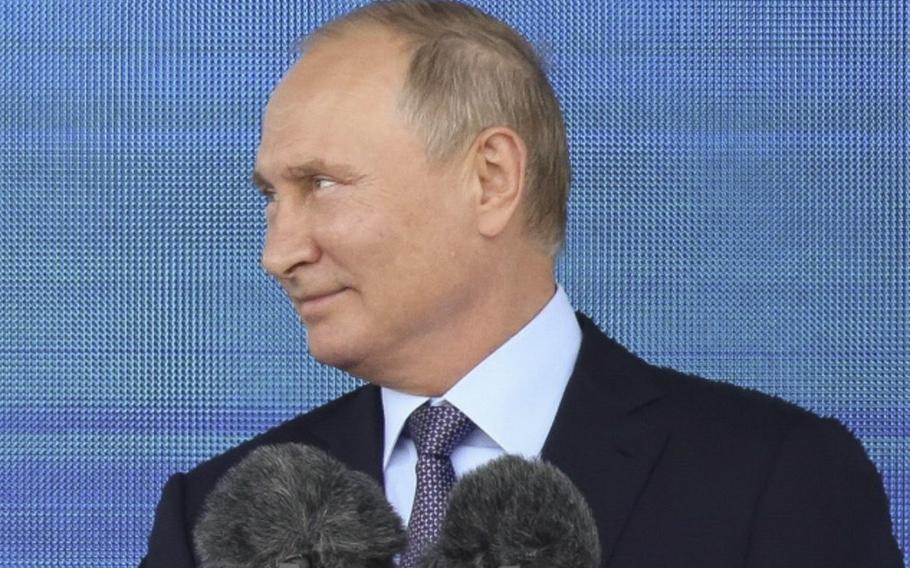
Vladimir Putin, Russia’s president, at a news conference in Moscow on Aug. 27, 2019. (Andrey Rudakov/Bloomberg)
Top officials told the Kremlin’s annual economic showcase that Russia’s bearing up better under sanctions than initially feared, touting a new model focused on domestic production as the country faces unprecedented international isolation over its invasion of Ukraine.
Fewer foreigners turned up at this year’s St. Petersburg International Economic Forum, an event that in the past drew major global leaders and top executives from the world’s biggest companies. They were replaced by local businesspeople who attended a slew of sessions on Russia’s need to become self-reliant, according to attendees.
Visitors to President Vladimir Putin’s answer to the World Economic Forum include officials from the Middle East, Asia and self-proclaimed separatist republics backed by Russia in Ukraine. Also in attendance are representatives from the Taliban, who have proved popular among delegates seeking selfies.
Many Russian participants have been reluctant to share the spotlight, fearing it could make them targets of sanctions by the U.S. and its allies, and several panels were reshuffled at the last minute. Many of the remaining speakers have already been hit.
Even so, the mood was upbeat at Thursday’s main economic session, at which no mention was made of Ukraine or the war. The government will revise down its forecast for a contraction in gross domestic product this year, Economy Minister Maxim Reshetnikov said.
“We see that the measures that are being taken so intensively are having a result,” he said, without specifying the new figure. At present, the authorities foresee a decline of 7.8%.
But Reshetnikov warned that unlike past recessions, where recovery got the economy back on the previous track, this time will be different. “Our goal is to buy time to allow a structural overhaul to take place,” he said.
Russia needs to rethink its focus on exports, which had long been an engine of growth and source of hard currency, central bank chief Elvira Nabiullina said. With sanctions depressing prices for the country’s key products and boosting the cost of imports, industry needs to concentrate on the domestic market, she said.
Finance Minister Anton Siluanov lamented that “the globalization we were heading for before turned out to be not nearly as comfortable for countries, so to speak.”
That triggered a note of realism from the panel’s moderator, who pointed out that the country’s biggest carmaker has introduced a new post-sanctions model stripped of many key features.
“I don’t want to spend time listing all the things this car won’t have but there is one achievement that it will definitely have: this stripped down version will cost more than the fully equipped one did,” said Andrei Makarov, a legislator from the ruling party. “Does this mean our import-replacement will continue on the principle of lower quality for more money?”
Siluanov dismissed the problem as only an issue for the state if government workers were told to drive Russian cars, prompting his press service to issue a statement clarifying that he had not proposed making officials drive stripped-down Ladas.
AvtoVaz, the car company controlled by Renault until last month, later offered to provide Ladas for any officials who need them, state news service Tass reported.
Kremlin Economic Aide Maxim Oreshkin said that Russia’s “economic development machine” had lost a few parts — high-tech items, financing and such.
President Vladimir Putin summoned officials and industry executives for a meeting later in the day to discuss ways to turn around the steep decline in the auto sector. Car sales are down 80% and nearly all the country’s auto factories are shut due to sanctions and parts shortages.
The party circuit, like the latest Lada models, is stripped down. Whereas stars like Sting and Robbie Williams performed at forum events in the past, most soirees this year are sponsored by state companies and rely on Russian talent.
Even then, there have been last minute changes. The band B-2 was pulled from headlining one party after they recently refused to play in a Siberian city because of a pro-Putin banner that referenced the war in Ukraine, Izvestia reported. They were replaced by a rocker who has been showing off a new chest tattoo that reads, “Motherland or death.”